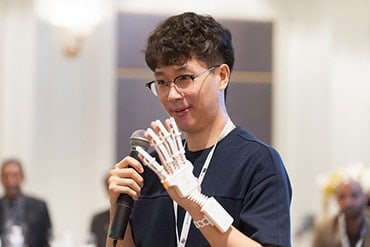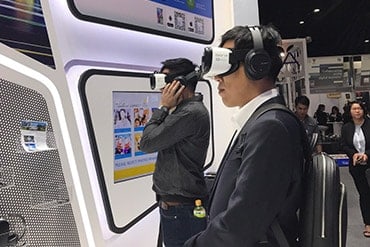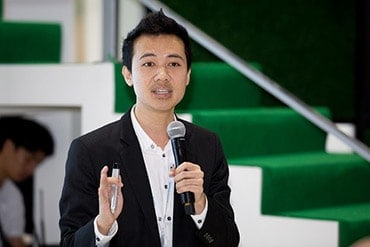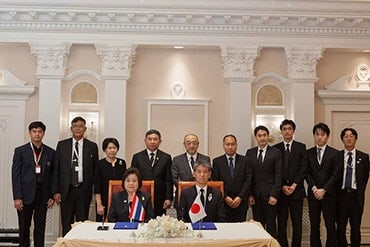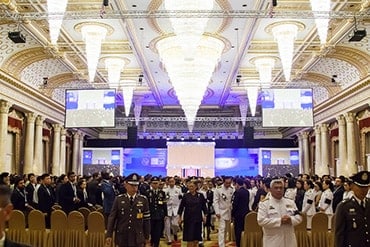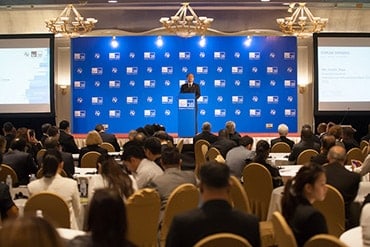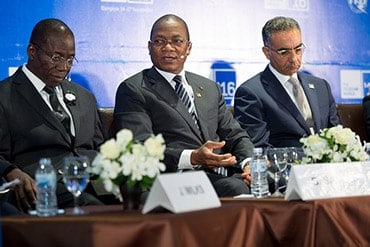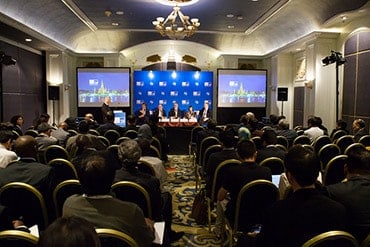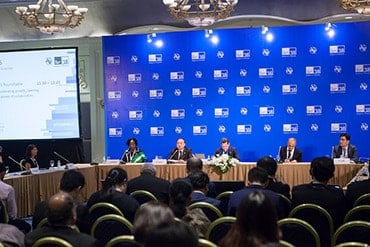
Inviting ICT leaders from across the ecosystem to work together, to engage world leaders in dialogue and act as spokespeople for the industry, ITU Secretary-General Houlin Zhao opened proceedings at the Industry Leaders Roundtable on “Creating value, accelerating growth, opening new markets: the power of collaboration”.
“It is seen as a profitable, stable industry, but sometimes there is a risk that the money is taken away or the need to support the industry with investment from the public side endangers that environment,” he said, stressing that “collaboration is the only way to overcome challenges and make progress.”
Kicking off the roundtable by describing the incredible pace of change in the Nigerian market, Funke Opeke, CEO, MainOne Cable, highlighted how “opening up the market to accelerating growth, it is amazing to watch the significant shift from cash-based banking to cashless banking”. Financial services, online shopping and banking are flourish as paper-based transactions disappear in the digital economy. Infrastructure sharing amongst operators and providers, pushed together by market realities and regulatory pressure, has brought this change about in West Africa. Without a high degree of collaboration, the lack of quality access would have rendered this level of growth impossible
As one of the verticals in the payment space, Yvette Oh, Mastercard, focuses on collaboration with the telco sector to bring as many as possible of the 2.5bn financially excluded into the global economy. Mobile networks have the international reach across all sections of society, Mastercard the financial services: without a multi-stakeholder partnership between a whole mini-ecosystem of banks, telcos, ISPs, payment service providers, regulators and policy-makers, this would simply not happen.
And the results have been impressive – a great example being the collaboration with the South African government social security agency, which brought 10m people into the formal economy for the first time.
Mobile devices provide access, but interoperability is really the key if all these industry players and verticals are to come together and work as one to deliver solutions. Developing low-cost solutions to bring the unconnected online is difficult – do you invest in infrastructure if there is no demand, or ability to pay? asked Oh, summarizing a key conundrum of connectivity. “We have leveraged mobile technology to enable micro and SME merchants to accept payment,” she explained, “and these stores are themselves underserved businesses serving the underserved,” indicating that it is not expensive devices but working with different industries on the ground that might lead to financial inclusion.
Interoperability is indeed critical, according to Inmarsat CTO Michele Franci. Wherever people go today, they want solutions and services adapted to their situation. The advantage of the satellite industry – itself fundamentally based on collaboration – is that “it allows us to put in place a lot of solutions for areas where not much choice, and create more and more of the infrastructure, the enablers”, for communication –based applications and services for everyone in the world.
For Lars-Åke Norling, CEO, Total Access Communication, freeing up spectrum is essential to enable mobile operators to provide data to meet the needs of customers and provide the digital space for online services and sales with OTT players. Collaboration in terms of infrastructure, with towers or fibre, is happening today, he said, but “trust is necessary for payment to take off and for collaboration in vertical sectors”.
Perhaps there is a more fundamental problem, queried Suneet Singh Tuli, CEO, DataWind Net Access Corporation, given that so many data platforms go unactivated, or are just used for social media rather than banking or commerce. The reason is affordability. Affordable internet access has long been are target, but we will not make progress if we do not look at innovative data plans in the very lowest income segment – where consumers can afford to spend as little as USD0.30 a month. “We need to create affordable solutions and collaborate between ecosystems – and then we will see accelerated growth.”
Affordable, perhaps, but not free. “The problem with the concept of free is that someone ultimately pays, and it is not sustainable,” added Tuli.
From a research perspective, Thomas Wiegand, Executive Director at Fraunhofer Heinrich Hertz Institute, sees a significant shift in the research contacts and customers with whom he works. Exclusively telco has now moved to an eclectic mix of mobility industry, smart cities, e health and smart energy in a dramatic increase. This brings with it the challenge of new industries and partners with different cultures, systems and models in place – on the ground, in reality, “collaboration is a challenge.
For the mobile sector in Thailand, however, collaboration is an essential element of sustainable growth, from infrastructure sharing to land lease, roll out and maintenance, so that operators can save time and money – and are freed up to focus on new services and apps interfacing with the platform. Seven operators have collaborated in co investment and laying cables, involving also the public sector in the form of the national electricity authority. Collaboration like this will form the basis of smart cities, the next big thing in Thailand, pointed out Preeyaporn Tangpaosak, Chairman of the Executive Board, at ATL.
And a very pertinent example of collaboration between major industry players was presented by Dongmyun Lee, CTO, KT Corporation, who described how the ongoing slowdown in the Korean telecom market had led to a search for “a new growth engine based on our own infrastructure,” building out 5G infrastructure for a working case of the ecosystem in the Olympic Games to be held in Korea in 2018 – partnering with Nokia for some elements.
Hossein Moiin, Executive VP and CTO, Nokia, was optimistic about such partnerships and about collaboration in the industry in general. “Each time we build a new generation of networks, we are able to increase the total output of the ecosystem by a factor of 3”, he said. That success is built on a collaborative model between operators, government, research institutes and standards bodies. We must build on this to move forward, he urged, and to ensure that the trillions of dollars of value created is distributed fairly through the ecosystem – creating value and benefit for all in the digital economy.
Moderator
- Mr Paul Conneally, Head of Communications, International Telecommunication Union, Switzerland
Opening Remark
- Mr Houlin Zhao, Secretary General, International Telecommunication Union, Switzerland
Panellists
- Mr Michele Franci, Chief Technology Officer, Inmarsat SA, United Kingdom
- Dr Dongmyun Lee, Chief Technology Officer, KT Corporation, Korea, Republic of
- Mr Hossein Moiin, Executive Vice President and Chief Technology Officer for Nokia Mobile Networks, Nokia Corporation, Finland
- Mr Lars-Åke Norling, CEO, Total Access Communication PLC (dtac), Thailand
- Ms Yvette Oh, Group Executive, Market Development, APMEA, International Markets (IMK), MasterCard Worldwide, Singapore
- Ms Funke Opeke, Chief Executive Officer, MainOne Cable, Nigeria
- Mrs Preeyaporn Tangpaosak, Chairman of the Executive Board, ALT Telecom PCL, Thailand
- Mr Suneet Singh Tuli, Chief Executive Officer, DataWind Net Access Corporation, Canada
- Dr.-Ing. Thomas Wiegand, Professor at TU Berlin and Executive Director at Fraunhofer Heinrich Hertz Institute, Fraunhofer Heinrich Hertz Institute, Germany


